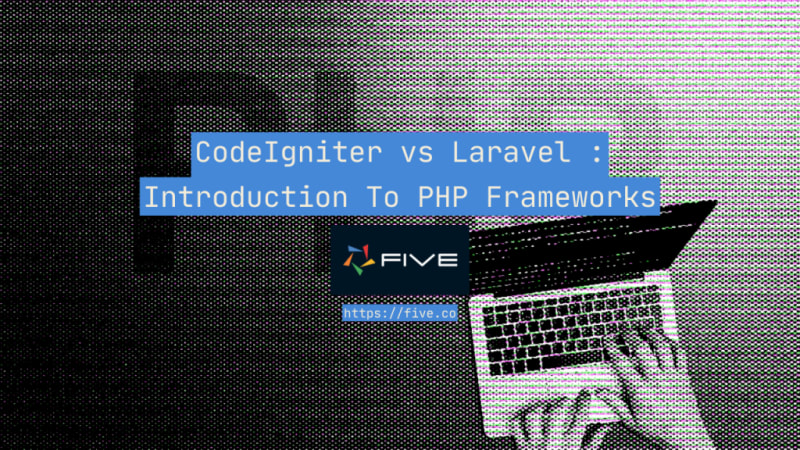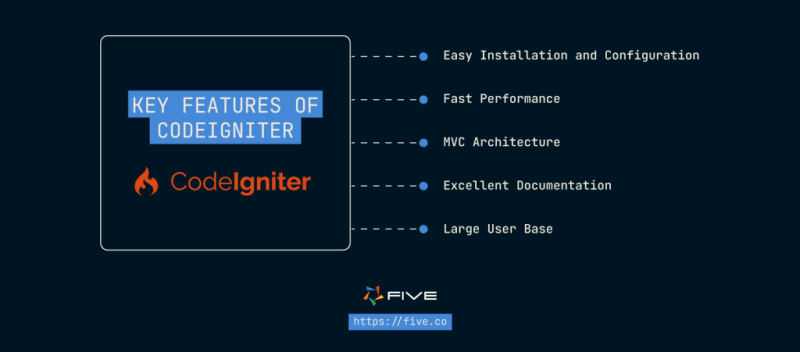In the world of web development, PHP has always been a popular choice due to its flexibility and extensive libraries. However, coding a project from scratch can be time-consuming and error-prone. That's where PHP frameworks come into play. They provide a structured and efficient way to build web applications, speeding up the development process and ensuring best practices. Among the myriad of PHP frameworks available, two have emerged as leaders: CodeIgniter vs Laravel.
- CodeIgniter: A Lightweight Powerhouse
- Laravel: The Elegance of Modern PHP
-
CodeIgniter vs Laravel: Which One to Choose?
- Introducing Five
- Conclusion
CodeIgniter: A Lightweight Powerhouse
Key Features and Benefits
CodeIgniter is known for its lightweight nature and simplicity. It focuses on providing a minimalistic approach to web development without sacrificing power and flexibility. Here are some of the key features and benefits of using CodeIgniter:
- Easy Installation and Configuration: With CodeIgniter, you can get up and running quickly. Its installation process is straightforward, and the configuration is incredibly easy thanks to the clear and well-documented guide.
- Fast Performance: CodeIgniter's lightweight architecture allows it to perform exceptionally well, even under heavy loads. It's an ideal choice for projects that require high performance and scalability.
- MVC Architecture: CodeIgniter follows the Model-View-Controller (MVC) architectural pattern, separating business logic, data, and presentation. This promotes code organization and makes maintenance a breeze.
- Excellent Documentation: CodeIgniter sets the bar high in terms of documentation. The official user guide is comprehensive and easy to navigate, covering every aspect of the framework. Plus, the vibrant community is always ready to help out.
- Large User Base: CodeIgniter has been around for quite some time, which means it has built a substantial user base. This translates to a wealth of resources, tutorials, and support available online.
Use Cases and Real-World Examples
CodeIgniter is suitable for a wide range of projects, including but not limited to:
- Small to Medium-Sized Applications: If you're building a small to medium-sized application, CodeIgniter is an excellent choice. It provides just the right amount of functionality without overwhelming you with unnecessary features.
- Rapid Prototyping: CodeIgniter shines when it comes to rapid prototyping. Its simplicity and ease of use allow you to get a functional prototype up and running in no time.
- API Development: Due to its lightweight nature, CodeIgniter is well-suited for building APIs. It allows you to create RESTful APIs quickly and efficiently.
A real-world example of a project built with CodeIgniter is EllisLab's ExpressionEngine. ExpressionEngine is a powerful content management system (CMS) that utilizes CodeIgniter as its core framework.
Laravel: The Elegance of Modern PHP
Key Features and Benefits
Laravel, on the other hand, is more feature-rich and provides a modern approach to PHP development. It gained popularity due to its powerful features, extensive ecosystem, and developer-friendly syntax. Let's explore some of the key features and benefits of using Laravel:
- Elegant Syntax: Laravel boasts an elegant and expressive syntax that makes PHP development a joy. It utilizes modern PHP features and concepts, making your code more readable and maintainable.
- Artisan CLI: Laravel comes bundled with "Artisan," a powerful command-line interface (CLI) tool. With Artisan, you can automate common tasks, generate boilerplate code, and even run tests effortlessly.
- ORM: Eloquent: Laravel's Eloquent ORM simplifies database interactions and makes working with databases a breeze. It provides a simple and intuitive syntax, allowing you to perform complex database queries with minimal effort.
- Blade Templating Engine: Laravel's Blade templating engine offers a clean and efficient way to manage your views. It provides features like layout inheritance, control structures, and reusable components, enhancing your development experience.
- Vibrant Ecosystem: Laravel has a thriving ecosystem with a wide range of packages and extensions available. Whether you need payment integrations, caching solutions, or anything in between, chances are there's a Laravel package for it.
Use Cases and Real-World Examples
Laravel is suitable for a variety of projects, especially those that require rich features and scalability. Here are some common use cases for Laravel:
- Enterprise Applications: If you're building large-scale enterprise applications, Laravel's rich feature set and powerful ecosystem make it an excellent choice. Its robustness and scalability can handle complex requirements with ease.
- Content Management Systems: Laravel's elegance and extensibility make it perfect for building content management systems. Its modular structure allows for easy customization and integration of additional functionality.
- E-commerce Platforms: Laravel's extensive ecosystem provides numerous packages for building e-commerce platforms. It offers features like payment gateway integrations, inventory management, and order processing.
A popular real-world example of a project built with Laravel is October CMS. October CMS is a flexible and user-friendly CMS that utilizes Laravel as its underlying framework.
CodeIgniter vs Laravel: Which One to Choose?
Now that we have explored the key features, benefits, and use cases of both CodeIgniter and Laravel, Let's take a close look at their technical features side-by-side.
CodeIgniter Vs Laravel : Feature Comparison
| Feature/Aspect | CodeIgniter | Laravel |
| Database Model | Object Oriented | Relational Object-Oriented |
| Authentication | Requires custom extensions for authentication and authorization. | Comes with built-in Authentication Class features. |
| Unit Testing | No inbuilt unit testing tools. Requires third-party tools. | Inbuilt PHPUnit for thorough and continuous application code testing. |
| Learning Curve | Easier for Beginners. | Offers many additional features which might be challenging for beginners. |
| Support for REST | Does not facilitate streamlined development of REST APIs. | RESTful Controllers for easy development of REST APIs. |
| Modules | No built-in modularity features. | Designed with built-in modularity. Allows project division into small modules through bundles. |
| Template Engine & API | No built-in template engine. | Comes with Blade template engine. Allows performance enhancement and view manipulation. |
Apart from their technical specifics, here are some other essential factors to weigh in before choosing between CodeIgniter and Laravel:
- Project Size: CodeIgniter's lightweight nature makes it a perfect fit for small to medium-sized projects. If you're working on a larger project that requires extensive features and scalability, Laravel might be a better choice.
- Ease of Use: CodeIgniter's simplicity makes it extremely easy to learn and use. If you're new to PHP frameworks or want a minimalistic approach, CodeIgniter is the way to go. On the other hand, if you're comfortable with modern PHP and appreciate an expressive syntax, Laravel is worth considering.
- Ecosystem and Community Support: Laravel's vibrant ecosystem and large community ensure that you have access to a wide range of packages, extensions, and resources. If you prioritize the availability of robust third-party libraries and active community support, Laravel might be the better choice.
- Longevity and Stability: CodeIgniter has been around for a longer time and has a proven track record. If stability and backwards compatibility are crucial to you, CodeIgniter might be a safer bet. Laravel, on the other hand, is continuously evolving and adopting the latest PHP features and best practices.
Ultimately, both CodeIgniter and Laravel are solid choices for PHP web development. It all boils down to your project's requirements, your personal preferences, and your development team's expertise.
Introducing Five
Traditional PHP frameworks like CodeIgniter and Laravel have long been the go-to solutions for some time. They offer structured approaches, MVC architectures, and a plethora of libraries.
Unlike the conventional PHP frameworks, Five is a little different, it is a low-code development environment designed to accelerate the process of building and deploying online database applications. Here's how Five stands out:
- Simplicity Meets Power: Just as CodeIgniter is known for its lightweight nature and Laravel for its elegant syntax, Five combines the best of both worlds. It offers a drag-and-drop database designer, a visual query builder, and form/chart wizards.
- Extensibility: While frameworks like Laravel provide an expressive ORM in Eloquent, Five, not only allows standard SQL but also offers extensibility through JavaScript or TypeScript.
- Full-Stack Web Apps with a Twist: While CodeIgniter and Laravel are excellent for building PHP-based web applications, Five lets you create standalone web applications with unique URLs, logins, and a dedicated MySQL database, all with fewer lines of code.
Whether you're leaning towards traditional frameworks or exploring new avenues like Five, the key is to choose the platform that aligns with your project's goals. For a deeper dive into what Five offers, check out the documentation for Five here.
Conclusion
PHP frameworks have revolutionized web development by providing structured and efficient ways to build applications. CodeIgniter and Laravel are two popular PHP frameworks that cater to different needs and preferences.
CodeIgniter's lightweight nature, ease of use, and excellent documentation make it a great choice for small to medium-sized projects and rapid prototyping. On the other hand, Laravel's elegance, extensive ecosystem, and powerful features make it ideal for larger projects and enterprise applications.
When choosing between CodeIgniter and Laravel, consider the project size, ease of use, ecosystem support, and longevity of the framework. Both frameworks have proven their worth and have thriving communities, so you can't go wrong with either choice.
So, whether you go the lightweight route with CodeIgniter or embrace the elegance of modern PHP with Laravel, both frameworks are sure to enhance your web development experience and make your projects shine.






Top comments (0)